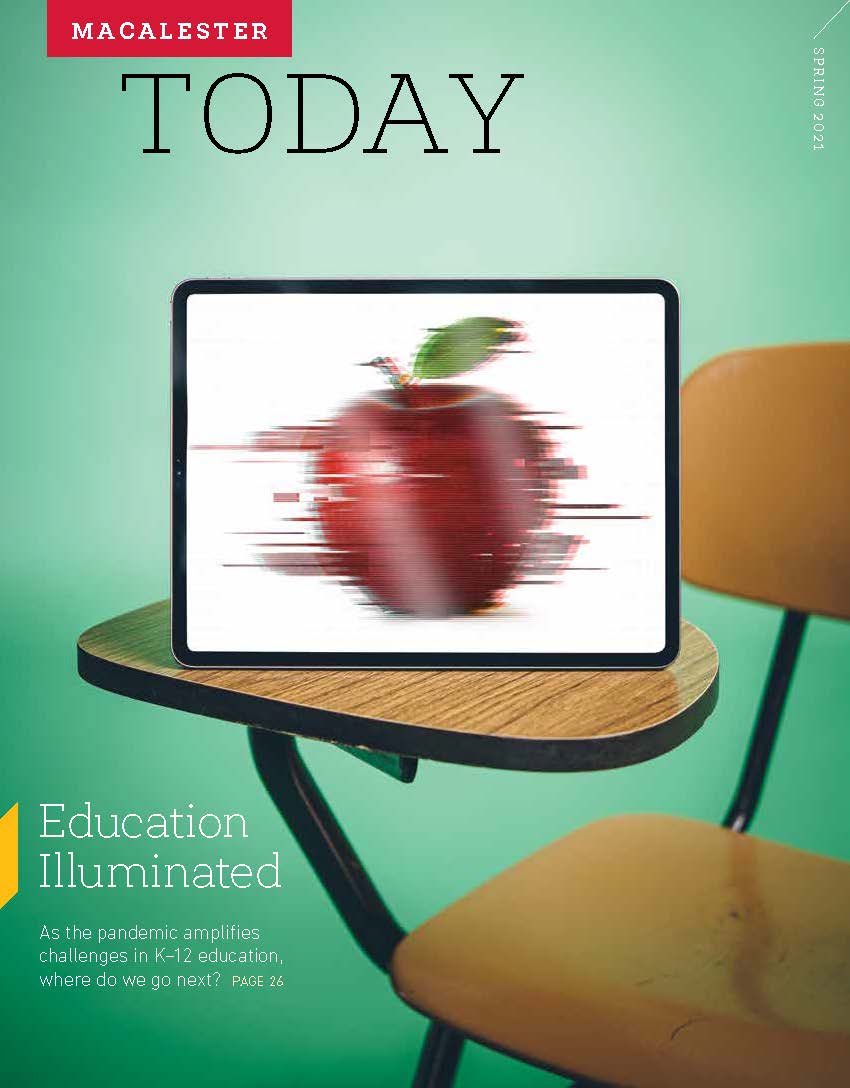
“My students remind me all the time how important it is to approach this work with humility, with an understanding that this isn’t ‘me helping you,’ this is all of us trying to take the edge off these systems of inequity.”
—Christie Manning
The sustainability office is evolving fast. When environmental studies professor Christie Manning was named Macalester’s new sustainability director in January 2020, part of her mission was to redesign the college’s approach to sustainability issues using a framework of environmental justice. Through partnerships with Twin Cities mutual aid networks and nonprofits, the office is working to reroute its focus toward dismantling environmental exploitation and white supremacy in Macalester’s own backyard.
Since 2014 Macalester students have operated a chapter of the Food Recovery Network (FRN)—a student-led movement that endeavors to donate excess food from dining halls across the country. While the coronavirus pandemic has made that work more challenging, students continue to collect unserved food and hope to expand the program when it becomes safer to do so.
Lately, student workers and volunteers have also employed the school’s ongoing Free Swap program, which has long been available to students as a place to donate or collect lightly used items of clothing and other essentials without cost, to deliver supplies to nearby houseless encampments. That work has been accomplished through a partnership with a local mutual aid organization—the People’s Protection Coalition. Mutual aid systems, in organization theory, are efforts in which people take responsibility for caring for one another and creating change.
These programs, Manning explains, are a clear example of the overlap between sustainability and social justice work.
“One of my goals is to have a new, wider definition of sustainability at Macalester,” Manning says. “Sustainability is also about preserving human well-being, and making it possible for all humans to survive and flourish.”
Facilities zero-waste coordinator Charlee Gorham ’21 (Woodbridge, Conn.) agrees.
“Environmental exploitation always directly harms low-income communities and communities of color much more than wealthy white communities,” says Gorham, citing interwoven examples of St. Paul housing and intentional redevelopment history, including the displacement of families from the Rondo neighborhood to build I-94 in the 1950s and 1960s and how that relates to the houseless encampment along the interstate today. “Macalester is a part of the redevelopment that changed our neighborhood’s environment. As people who benefit from that ongoing exploitation and gentrification, we have to do our part to repair the damage.”
As Gorham points out, there is a history of ‘white savior’ narratives surrounding the pursuit of environmental justice. At majority-white campuses like Macalester, efforts to center historically marginalized communities in environmental activism can be read as self-serving charity work rather than as an integral part of the office’s mission.
“My students remind me all the time how important it is to approach this work with humility, with an understanding that this isn’t ‘me helping you,’ this is all of us trying to take the edge off these systems of inequity,” Manning says. “What happens within Macalester affects the larger Twin Cities community, and vice versa.”
Gorham implores Mac alumni to connect with mutual aid work happening wherever they live—or even start a food recovery network of their own. “Our college degrees give us power and privilege. Give everything you can to the most vulnerable in your communities,” Gorham says. “This is how we reimagine community care.”
February 24 2021
Back to top





